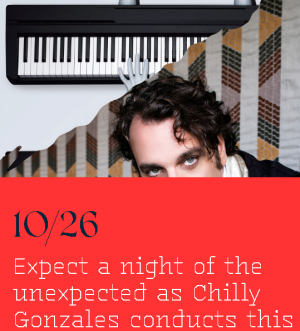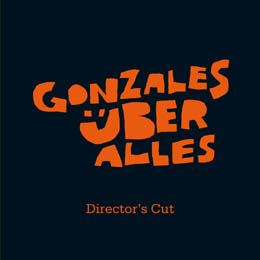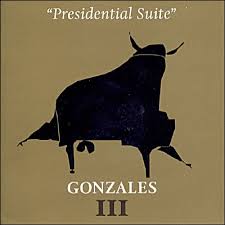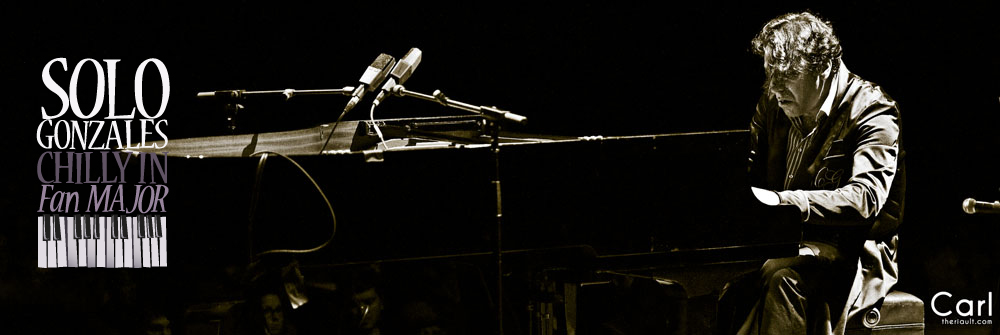 Summers in Canada are never long enough; nature seems to be able to “cram in” a year of growth in a few short months and we end up trying to do the same for trips to the beach and cottage, and all manner of work that has to take place outdoors. Taking a break from work or school always seems to provide a “tangential” inspiration for a new approach to a problem, or even coming up with entirely new ideas. This year, the end of summer also means that Gonz’s “radical sabbatical” is about 3/5 of the way through, but with his new Apple Beats One show (Music’s Cool with Chilly Gonzales) it appears that he hasn’t completely stepped away from public view. When we read that Gonz will be participating in the Red Bull Concert Academy in Montreal (with a special « Gonzervatoire Masterclass Concert » on October 26th), we were overjoyed as the series has a reputation for bringing together some of the best and most forward-thinking musicians on the planet. One of our favourite interviews with Gonzales was a 60-minute interview & music segment taken from a Red Bull Concert Series show (“Fireside Chat”) back in 2010. At that time, “Ivory Tower” was just released, and Gonzales was heading into a very productive (and incredibly busy) segment in his ever-morphing musical career. The interview is still available at RBMA Radio.com – let’s dive in and see what Gonzales had to say:
Summers in Canada are never long enough; nature seems to be able to “cram in” a year of growth in a few short months and we end up trying to do the same for trips to the beach and cottage, and all manner of work that has to take place outdoors. Taking a break from work or school always seems to provide a “tangential” inspiration for a new approach to a problem, or even coming up with entirely new ideas. This year, the end of summer also means that Gonz’s “radical sabbatical” is about 3/5 of the way through, but with his new Apple Beats One show (Music’s Cool with Chilly Gonzales) it appears that he hasn’t completely stepped away from public view. When we read that Gonz will be participating in the Red Bull Concert Academy in Montreal (with a special « Gonzervatoire Masterclass Concert » on October 26th), we were overjoyed as the series has a reputation for bringing together some of the best and most forward-thinking musicians on the planet. One of our favourite interviews with Gonzales was a 60-minute interview & music segment taken from a Red Bull Concert Series show (“Fireside Chat”) back in 2010. At that time, “Ivory Tower” was just released, and Gonzales was heading into a very productive (and incredibly busy) segment in his ever-morphing musical career. The interview is still available at RBMA Radio.com – let’s dive in and see what Gonzales had to say:
 Track #1: Past Your Bedtime (from the original Gonzales – Über Alles.
Track #1: Past Your Bedtime (from the original Gonzales – Über Alles.
We reviewed Über Alles previously here.
Hello, you are listening to a fireside chat on Red Bull Music Academy Radio with me, Chilly Gonzales – the musical genius. My music is not so important, I think what’s important is my message. I’m trying to be a role model; an example to show how entertainment can triumph over art, basically. And that I’m proof that the myth of the authentic artist doesn’t have to hold sway over the youth of today – the message is much more important than the music.
What’s he saying here? How can a musician say that his music is, “…not so important…”? On the surface, it would seem counterintuitive for him to place anything above his music – after all, he makes a living as a musician. It’s what he says directly after that provides a great deal of insight into Gonzales, and why he’s not like other artists. He’s saying that his message (e.g. entertainment trumps art) is more important than the music itself.
Take the iconic “Sunday Bloody Sunday” from U2. It’s a great song, but not specifically about the 13 Catholics shot by British soldiers in 1972 – it’s about people needlessly dying anywhere at any time because of hate. Their message was one of peace and tolerance, channeled through a powerful, addictive song. To U2, the message was more important than the music.
Gonzales’ message through his music is that you can do what you truly enjoy and feel is right as opposed to what an “accepted” path to success looks like. You have one shot at life – why not drive as hard as you can toward your goal with the best information and “gut feel” you can muster? Forget the critics – work hard at your talent and passion and people will respond.
Track #2: “The Worst M.C.” – from Gonzales Über Alles
Canada has a lot of good qualities, but these same good qualities are what make us good travellers. We’re a little bit adaptable. We’ve chose as our defensive pose against the competing interests of Europe and America around us. We’ve basically just chosen to step back and kind of develop a sense of humour to protect us from all of that. It means that our actual culture isn’t necessarily one that I aspire to. There’s a lot of folk singers, lot of indie rockers lot of musicians with beards in Canada. And a lot of the things that I hold dear, like musical accomplishment and entertainment value and humour – they aren’t really the main privileges of indie rockers. Indie rockers believe more in teaching yourself your own instrument – you don’t have to be really good at it. That attitude is enough. That humour doesn’t belong in music – that music should be something serious and sacred. So, all those things I don’t agree with. I left Canada because of that, and I came to a place where at least there’s smaller groups of people and smaller pockets of people who maybe are more hungry for something that combines the highbrow and the lowbrow stuff they love. That’s really what I’m here for.
Has anything changed in the Canadian music scene since Gonzales left (and returned)? Well, yes and no. With Canadian artists such as Drake, Justin Bieber, and Arcade Fire garnering global attention and awards, one could argue that the Canadian music scene has had a revival. But Canada still has a habit of dismissing artists who make it globally – all of a sudden, they’re not “Canadian”, as if being Canadian means never experiencing success on a global scale (they “sold out”). The “highbrow” and “lowbrow” are concepts that Gonzales has explored; the dichotomy between humour and deep emotion; classical music and prankster rap; sheer musical ability contrasted with a simple melody; and the list goes on. It’s as if Gonzales lives most comfortably in the amplitude between the highest highs and the lowest lows – he needs the headroom, and a big amplitude makes the most sound. Has Gonzales changed his musical taste as of late – moving deeply into Chamber and classical music? If you look, his music still has all of the high and lowbrow of old, but more subtly weaved into the beauty of a classical or solo piano composition. That’s a testament to his experience and growth as a composer and musician.
Let’s have a listen to “Let’s Groove Again” from my album “Gonzales Über Alles”. I’m going to sound really pretentious here – the chord sequence is ripped off – as many of my musical ideas are ripped of – from people who are dead and can’t sue me anymore. It’s open season on dead composer chord progressions. Let’s hear “Let’s Groove Again”.
No surprise here. If you’re listening to his Beats1 “Music’s Cool” show, you’ve heard that modern music is a progression from Classical ; an evolution of what the human brain hears and finds pleasant, and that our brains aren’t going to change their taste for music anytime soon. “Stealing” chord progressions from Composers is a great way to develop a foundation for a song – if it was a hit 150 years ago and survived until today, there must be something in the composition that appeals to modern ears. We now how instant access to over 100,000 works, from almost 15,000 composers – all filtered and searchable. Musicians who don’t study and take advantage of this vast library are missing out.
 Track #3: “Let’s Groove Again” from Gonzales Über Alles
Track #3: “Let’s Groove Again” from Gonzales Über Alles
“Chilly in F Minor” was the first song on my first album, and this was important the first song on the first album be something very musical, very simple, and I had bought this strange instrument called the Pianet and already had the idea that because this album was so electronic and hip-hoppy, I felt that in the end, I’m just a piano player and I don’t want to go out there and just say I’m a piano player but I feel like people have to know that about me, so at the last minute before the mastering session, I managed to crank out these three little songs on Rhodes that are on the whole album – sprinkled throughout – “Chilly in F minor”, “Chilly in B-flat minor”, and “Chilly in D-minor” – those three are on the album. But this is the first song on my first album ever – the first Gonzales track – let’s hear it.
Track #4: “Chilly in F minor” – from Gonzales Über Alles
I’ve always loved that quote, “in the end, I’m just a piano player”. It cuts to the core of what drives any one of us – we could all have our own “in the end…” statements if we look deep inside, and if you aren’t expressing that aspect of yourself though your work and/or life, then you’re suppressing the part of you that truly wants to shine. In retrospect, Gonzales likely saw how people responded to his “piano player” and likely discovered that he was unnecessarily suppressing that aspect of his personality up to that point. We previously covered the importance of the Pianet and “Chilly in…” compositions in our review of Über Alles. Suffice it to say, without those “last minute” additions, we may not have the Gonzales of today.
 Track #5: “Candy” – from “The Entertainist”
Track #5: “Candy” – from “The Entertainist”
Track #6: “Futuristic Ain’t S**t to Me” – from “The Entertainist”
I’m not out to prove that I’m good at music because it speaks for itself. A lot of musicians are still caught up in “there’s a lot of mystery in music.” For them – a lot of musician friends of mine – a lot of really good ones, I would never take that away, because that helps them. I just don’t have it, so I’ve just had to think of ways to do it. In a perfect world, maybe I would have it too, but there isn’t a lot of mystery in music for be because I’ve understood it in a technical way from when I was very young, and I kind of bypassed the whole idea of defining myself by musical taste. Because I enjoy listening to everything, because it appeals to my technical/scientific side. I kind of bypassed the whole taste thing and it puts me in a weird position to be a professional musician.
In another example of Gonzales capitalizing on an aspect of his personality, he expressing his love and ability for the technical and scientific side of music through his “Einslive” and “Music’s Cool” shows. Not strictly composition-based, those shows have appealed to a wide audience because of Gonzales’ frank and entertaining discussion of what makes great music, well…great. The sharing of knowledge and information has always been respected , and doubly so in an interconnected world – where online classes are freely available from the world’s best universities, it’s no surprise that Gonzales wanted to share an aspect of the music industry that he’s passionate about. For us, there also a message – sharing your skill and knowledge makes you more employable and valued – not less so. If you hide your techniques to try and gain advantage, soon the environment around you will change, rendering your skills obsolete, but someone who learns and teaches will always be in demand.
I would say that when I collaborate with someone, it’s not out of any real altruistic sense, or necessarily that I’m a good team player, but there’s just some thinks that I feel that I can’t say no to because I get very positively jealous of certain people. I see the world they’ve created artistically and it makes me jealous in a really good way – in an inspiring way. It makes me want to be close to it – it makes me want to know how they did it. And to find out if there’s something I can learn from it. So that kind of how my test for whether I work with someone is I have to be jealous of something they do – something about their personality. There’s a lot of people I like very much, I like them personally, and I like them their music, it’s just that I don’t think that I’m jealous of anything they can do, and so it wouldn’t make sense to work with them. Even some friends – even Sebastien Tellier. In a way, we occupy a similar space maybe, and so somehow, I don’t think we’re really jealous of each other, because we’re maybe a bit the same. And so I would never think that this would be the greatest collaboration on Earth, because I don’t think that we have that much to learn. Everything that he goes through, I’ve probably also gone though, and everything I’ve gone through, he’s also gone though and so there would be no surprises, but if I work with Jane Birkin for six months on a project, it gives me a different perspective, because I’m very inspired to know what it is to be this iconic figure in France and how she deals with that.
For all you sports fans, Gonzales likely wouldn’t be a team player taking orders from a gum-chewing coach and vying to be the ‘star’ player, or even actually be the coach – berating players, or even the manager overseeing the whole operation. He’d be the owner of the team – answering to no one but the paying public. It’s interesting how early on in education children as exposed to teamwork – either in gym or on joint projects, and (as Gonzales described) – it’s never equal or fair, and that carries into the work world as well. I believe there was an interview with Gonzales around the same time as the Red Bull series where they visited him at his old high school, and he expressed gratitude that the administration allowed him to skip gym to practice music. Maybe Gonzales’ experience in gym led somewhat to “Working Together” (which is covered later on).
Track #7: “Ain’t no Stoppin the Poppin” – from “The Entertainist”
Track #8: “So Called Party Over There” – from “Presidential Suite”
I’m expected to have very strong taste – to tell people, “This is what I like.” I like everything musically. I also hate everything musically; it beyond like and hate. So I have to put all of my energy into the Gonzales personality, and that’s where I have taste. That’s where really I have taste. Every photo of every musician, every interview I read, every choice of album title – I could have something to say, something to criticize in what I think are musicians who aren’t taking it seriously. And the people who do it well – those are the people I respect – the Daft Punks of this world. The people who find their own way to be entertainers – even if it’s not the most traditional way. When I started doing more extreme things and trying to let out a lot of what I thought were my “worst”, but most entertaining qualities of my personality – try to put them on stage – when I started doing that, it was very confusing and then very liberating to have people applaud your faults and after a while, you just get used to it, and you can do it pretty much at will. I’ve been “being Gonzales” for 11 years now – that was the moment I decided to consciously take parts of my personality that I would never have wanted to show people, and try to find a way to make it funny, to make it touching, a bit ridiculous, poetic, and see if that would work. And I’ve just been trying to find the right dose since that moment 11 years ago. I’m still trying to find how to weigh music, humour, and personality. Real hardcore, sincere reality, versus total surrealistic craziness. All that is just like trying to get the ingredients right.
Many people don’t realize how much of the world around them didn’t just ‘happen’; it’s easy to take things for granted. Take something as simple as a popular website. Fonts, colours, layout, images, are all subject to continual change and testing – it’s now a never-ending process to maintain pace with the changing taste of consumers. Likewise (as Gonzales mentions), every musical note, lyric, sound, arrangement, song order, picture, song title, album cover, promotional material, and so on is studied and researched to ensure that the message being portrayed works. Taylor Swift has a team of researchers and data scientists analyzing trends and what appeals to the widest possible target audience, which (eventually) ends up as a marker-scribbled Polaroid album cover. Those without attention to detail cannot be at the top of their game (and those who claim they just “got lucky” are being falsely modest). Entertainers have to change to suit their audience as well, but whereas it’s relatively easy to revert unpopular changes to a website, it’s impossible to “unrelease” as album (except as a marketing ploy). Once the music is in the “ether”, it’s unchangeable and the message surrounding the music can only be buoyed through interviews and media coverage. Not many of us face that daunting challenge, which is why people who make music and movies are a special breed.
 Track #9: “Bottom Of The Pops” (featuring Peaches) – from “Presidential Suite”
Track #9: “Bottom Of The Pops” (featuring Peaches) – from “Presidential Suite”
Track #10: “Shameless Eyes” (featuring Feist) – from “Presidential Suite”
Well, when you make an album on piano, there’s an illusion of purity, because it’s just one instrument, and there isn’t much distracting references. Because whenever you start adding instruments together, you’re subconsciously playing on a lot of references. You know, certain things will sound to certain people like the music of their youth – the 80s. Some people will say, yeah, it sound very much like it has a punk rock attitude; this is when you can really start to qualify music. When you hear something just being played on a single instrument like a piano, it gives a certain illusion that things weren’t mixed – that it was just something very, very pure. But it is an illusion – I was a little taken aback by people saying, “Oh finally, finally, we can like Gonzales because he’s doing something serious.” For me, making a piano record wasn’t’ me trying to be serious, and I suppose in retrospect, it became me trying to make a statement about what it is to be serious, because I think anyone who really likes my music wouldn’t necessarily say that that album is more serious. They can say they like it the best – I have no problem with that. If someone say they like it the best because they like the purity – that’s great. I just feel a bit like it’s too easy to say that that’s me showing my real face, or that’s the most serious album I’ve made. It was kind of a joke as much as the other ones were. Trying on the role of the solitary pianist – much as I try on the role of the Jewish rapper in Berlin, or I try on the role of president of the Berlin underground or I try on the role of the “superproducer” – there are all things that are just I see myself in these roles and so I try to see how they fit.
Solo Piano, in retrospect, is “a statement of what it means to be serious.” That’s a great concept – even if Gonzales didn’t realize he was making it at the time. What does it mean for people to take you seriously? It used to be a suit and grey hair, then changed to enthusiastic and fearless youth, and now pure attitude. How is it that the same person who just wrote the biting, “Candy” can sit down and release an album of sublime solo piano music? Was he “only joking” up to that point? Hardly, but the problem with perception and reality is one that appears again and again (see what happening in the current US election cycle). Gonzales is a persona, “the magician who reveals the trick” as he wrote early on. And that persona is freeing and confining simultaneously, constantly being re-shaped and re-formed to appeal to the whims of the “magician” and audience. For Solo Piano, Gonzales takes on the part of the “serious” musician, and (surprise?) that persona strikes a chord with the public. Great news, but also a bit terrifying, I would think, as many Solo Piano fans may not appreciate the brilliant, “The Entertainist” as much. We all assume different roles and personas at work, at home, with our relatives, with our friends, and even just out shopping. We’ve learned what works and what doesn’t over time to not be ostracized and to even be promoted, and it’s no different for the Gonzales persona.
Track #11: “Bermuda Triangle” – from Solo Piano
Well, Solo Piano – not my most serious album, but we’re going to have a listen now to Gogol – track number one off Solo Piano.
Track #12: “Gogol” – from Solo Piano
The lesson of Solo Piano for me – because it’s kind of the only album I’ve made that actually sold records and developed a bigger fan base – everything else has stayed very much in a sort of slightly hype – never really broke out of the hipster’s ghetto, as it were. So for Solo Piano to break out of that was an interesting lesson because it’s counter-intuitive, you wouldn’t think that making a piano album is going to break me out of the rut that I was in – especially as far as finding a bigger public. That was kind of a risk to take at that point, because I didn’t know how people would take it, and it really paid off.
Just as an aside, “Hipster’s Ghetto” sounds like a fantastic album title, but also lends insight into what Gonzales was dealing with at the time. Four albums in, and even a “best of…” pre-tirement retrospective (“Z”), and he still hadn’t “connected” with a large audience. Those albums are far and above what mainstream artists were releasing, but without the marketing muscle of a Warner or Sony, Gonzales was becoming more of an “underground” artist. The connections and ability for mainstream labels to connect with mainstream media and publications should surprise no one. Justin Bieber would still be a “YouTube” curiosity without “Scooter” Braun and a team of songwriters – the very same people that Gonzales alludes to in his radio show – professional “ear worm” developers who have an innate sense of what works with the current music-consuming public. For non-mainstream entertainers, their advantage is the ability to take chances, such as Solo Piano, because while the risks are fairly low (no million dollar advertising and production budget blown), the payoffs (monetarily and professionally) can be great. It’s the same story in many niche markets – small, nimble players can fill a new void much more effectively than larger corporations. The apocryphal “corporate red tape” story alludes to IBM’s internal bureaucracy in the 1980s, where it would have taken IBM at least 9 months to, “develop and ship an empty box.”
Track #13: “Armellodie” – from Solo Piano
“Working Together” – I’m really proud of these lyrics, unfortunately I feel like because it kind of became a hit in France, and they don’t speak English, and people thought I had made a really positive, feel-good, hit song, and it was a bit strange, because if you listen with any closeness to the lyrics as an Anglophone, the narrator of the song – we’ll he’s me, isn’t he? He’s not necessarily the “feel-good” type guy. It’s a song about how working together is inherently painful, never equal, but I suppose it’s worth striving for? Because sometimes you get further doing it? I don’t know. That’s the most positive message I can squeeze out of that song. And so I ask you as Anglophones who are listening to just listen to the lyric and not just get caught up in the finger-snappy, happy-clappy stuff, because this is a dark song. So suck it up. One of our favourite Gonzales songs, which combines the “snap-happy” feel with a dark and a deadly accurate depiction of what working together actually means. That being said, Gonzales seems to be more open to “working together” as of late – we’ll find out if this trend continues next year. Gonzales two “positive” messages only service to underscore how difficult it can be to have to work together. The video for “Working Together” is also one of Gonzales’ best.
Track #14: “Working Together” – from “Soft Power”
Track #15: “Singing Something” – from “Soft Power”
I guess I like the idea that music should be put into service of something a bit bigger than just itself. Music doesn’t really mean anything. So I do it in a small way by adding the personality of Gonzales into the mix, to try to add it to the music, which is, in a way, like the soundtrack to the Gonzales personality – that’s kind of how I’ve always seen it. That’s why I say that music isn’t as important as the message. And musicals have that. The idea of what singing is – a lot of it comes from the musical. The idea that at a certain point, in interaction with someone, there’s things you can’t say – you can’t express them, because you don’t want to express them, or because they’re hidden feelings you haven’t dealt with yet. And that’s when you sing – when you finally need to say something in a way that you can’t say with normal speaking words. That’s what got me interested in Broadway musicals, which ultimately led me to be interested in Rap, because then you have to ask the question, “Well, what is Rap?” Rap is more like speaking than singing so what’s the difference? The difference is rap is about the kind of talking we do when we’re actually talking to people, which is to say it’s full of bulls**t, because most talking between people involves a lot of bulls**t. You’re rarely saying 100% of what you think, so actual conversation is full of bluster, full of projection, and that’s why Rap is full of bluster and projection.
Do we all have a “soundtrack” to our personality, and is it reflected by the songs we choose to listen to, or are those songs more of what we’re striving for? It’s an interesting concept for Gonzales to mention – that his music is like a soundtrack or a Broadway musical. Does the music and message that the Gonzales persona chooses to exhibit reflect the true speaking voice of the underlying person “pulling the strings”? It’s fascinating (and approaches Freudian-type questions) when Gonzales sings, “Chilly G, looking into the eye – I stand behind him – put my emotions where no one can find ‘em.” That’s a persona singing about the underlying person expressing themselves through a persona, which is some 3D-level lyrical content. The answer may ultimately lie somewhere in-between – we can express and exaggerate parts of ourselves more easily through our persona, but how much of our persona ends up influencing the message that we ultimately impart? I would imagine that some major label rappers are very soft-spoken and introverted individuals in “real life” – but that side of their personality is likely buried deep inside.
Track #16: “Apology” – from “Soft Power”
Track #17: “Never Stop” – from “Ivory Tower”
“Ivory Tower” – which is also the name of the movie, well, it’s a much more electronic sound because half of the album was really the genius of Boys Noize – this Berlin-based DJ, producer, and label head, and it was just nice to be able to let someone else make a lot of the decisions that normally would be really stressful – I was really happy to have that and it let me also focus my energy on making the movie because that’s a much bigger undertaking than making an album, actually. More people, more money, more energy. So it was nice in this case that I didn’t have to be the one stressing about the album and every single note on it like I usually do. Well, the film is a “sports” movie about chess players in Canada. It’s fairly ridiculous, but also hopefully touching also. It’s basically trying to take the formula of what I do onstage in terms of how I combine humour and more serious things. It stars Tiga and Peaches and myself and I wrote it, produced it, and starred in it, so I have a lot of jobs, but I didn’t direct it – I didn’t play all the roles.
“Ivory Tower” is a great movie that translates many of Gonzales’ concepts to a visual medium – the most compelling of which is the “artist vs. entertainer” debate. It’s a difficult decision that most of us have to make at some point in our lives, and there are advantages and disadvantages to either side (as depicted in the movie). The soundtrack is brilliant, and led up to another collaborative project between Gonzales and Boys Noise (Octave Minds, which we reviewed), plus an amazing live show in an abandoned radar installation in Germany.
Hi, I’m Chilly Gonzales, the musical genius. You’re listening to Fireside Chat on Red Bull Music Academy Radio. I think if you’re lucky enough to find something you love in life, you’re already ahead of everyone else. If you can make a living doing it, then it’s like you’ve won the lottery. If you get rich doing it, you have no right to complain about anything.
A great quote with which to end the interview – something that truly speaks for itself. We as Gonzales fans consider ourselves lucky as well, since we have the wonderful and fascinating music, persona, lessons, and insights of one of the best and most entertaining artists around today.
We’re looking forward to the announcement of a special Red Bull show in Montreal this October as part of the music series, along with other influential artists, and we’re especially looking forward to the triumphant return of Gonzales to the touring circuit starting this December (with possibly some new compositions).
« The message is more important than the music »: A ‘core’ set of messages does appear to be imparted through Gonzales’ music and concerts – hard (sweaty?) work, talent, emotion, and humour wrapped in an entertaining package almost seem to define what makes us human. Marshall McLuhan famously said the « medium is the message » in that the way that we consume information is far more important than what was actually consumed. In the case of Gonzales, one doesn’t have to look far to see the impact of his messages; they are abundantly clear by the positive effect his music has on us.

